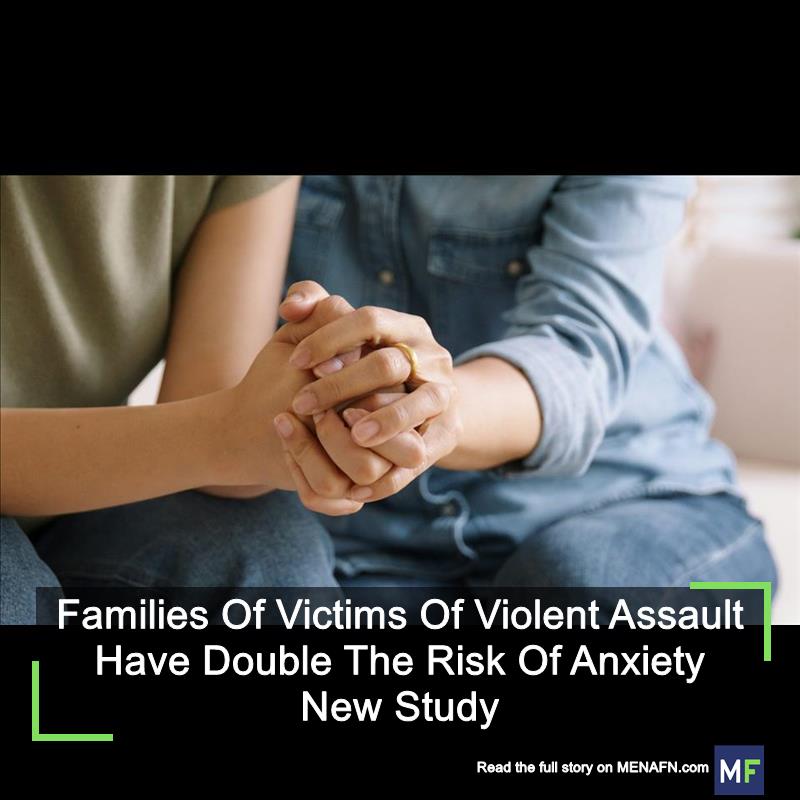
Families Of Victims Of Violent Assault Have Double The Risk Of Anxiety New Study
In addition to the harm suffered in the assault itself, they may also experience mental and physical health effects that last far longer. They often need the support of health and victim services, and they might have contact with the police or criminal justice.
The effects of violence can also ripple through whole families. Our new study reveals that many people in England are closely related to a victim of serious assault and that these people are twice as likely as the rest of the population to experience fear, anxiety and depression.
We worked with data from the UK government's key source of official statistics on mental health: a national survey of over 7,000 adults . The questionnaire asked whether people were closely related to someone who had experienced a serious assault, alongside questions about their lives and assessments of their mental health.
The analyses showed that as many as one adult in 20 was closely related (as the parent, child or sibling) to a serious assault victim in England.
These people were more likely than the rest of the population to be younger, to live in social housing and come from most deprived neighbourhoods. They were more likely to experience other types of adversity in their lives too, such as financial stress and homelessness.
Family members also experienced worse mental health than people not related to a victim. They were more likely to feel fear in their neighbourhood, to have depression or an anxiety disorder, to screen positive for post-traumatic stress disorder (PTSD), and to report self harm, feeling suicidal or a suicide attempt.
People related to a victim of assault were also more likely to have been a victim of violence themselves. Our analyses found that it was their own experiences of violence and adversity that accounted for family members' higher rates of PTSD, self harm and feeling suicidal. However, even when controlling for this, family members remained more anxious and more than twice as likely to be fearful in their neighbourhoods than the rest of the population.
Assault victims and their families often share the same risks for violence, such as living in a high crime area. Violence often occurs within households, and it is possible that the victim and their family had been assaulted by the same person, or that one had harmed the other.
Read more: How to support someone who is experiencing domestic abuse
A source of supportFamily members of serious assault victims experience the effects of violence in different ways. They may physically intervene in an assault to protect the victim, or witness an attack taking place. They may see the distress that an assault causes their loved one or feel guilty that they could not protect them.
It is also likely that families will acquire new caring and support roles, taking on additional responsibilities in the household or having to work more hours because they have lost an income.
Alongside a network of friends, colleagues and neighbours, relatives are critical sources of help , emotional support, and even advocacy for victims and survivors of violence.
However, there is little recognition of the burden of these roles and experiences on families. Nor are there enough resources allocated by the government to support families in these roles, including the negative effects of caregiving on mental and physical health they may experience.
Family members of violent crime victims are more likely than the rest of the population to experience fear and anxiety. Yuri A/Shutterstock The cost of violence
The UK Home Office puts the economic and social costs of crime in England and Wales at around £50 billion a year. This includes costs for crime prevention measures and the criminal justice system, as well as the costs associated with damage and injury to direct victims.
Violent crime makes up three quarters of this estimate, despite making up only a third of the number of crimes. The estimate does not, however, consider the costs associated with the distress and harm to victims' families, for example relating to their needs for support.
Government recognition of the impact of violence on victims' families when it sets budgets would go some way to ensuring that sufficient resources are allocated to support services for victims and their families.
The effect of violent crime on families must be considered in the context of already reduced funding and resources for service providers. Between 2020 and 2021, more than a quarter of specialist domestic violence and abuse organisations in England and Wales were forced to cease offering services due to a lack of funding.
The new Victims and Prisoners Act 2024 takes important steps towards this by recognising people who have“seen, heard, or otherwise directly experienced” the effects of a crime. However, it is important to remember that families are affected in many other ways, for long after the crime itself. Governments must ensure that support services for families are adequately resourced to deal with the harms they experience, and support them with the vital care they provide.

Legal Disclaimer:
MENAFN provides the
information “as is” without warranty of any kind. We do not accept
any responsibility or liability for the accuracy, content, images,
videos, licenses, completeness, legality, or reliability of the information
contained in this article. If you have any complaints or copyright
issues related to this article, kindly contact the provider above.


















Comments
No comment